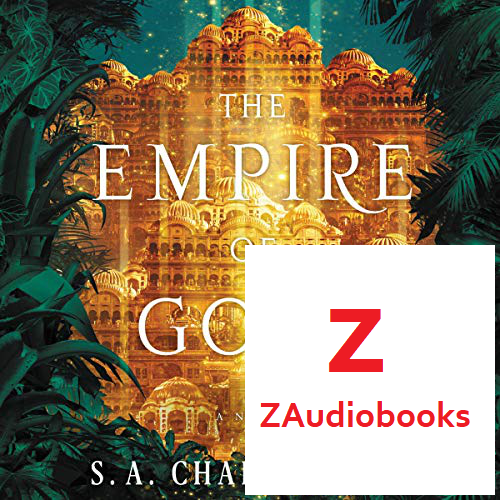This is The Empire of Gold (The Daevabad Trilogy #3) audiobook (rate button is after the title, please rate and leave a comment to share your thoughts. If the the description is missing, we will update soon or you can share anything you know about this audios it in comments section. Thank @Wayne for sharing this audios). Lets play The Empire of Gold (The Daevabad Trilogy #3) full audios free online in the audio player below.

Overview of “The Empire of Gold” (The Daevabad Trilogy #3):
1. Author and Background:
S.A. Chakraborty is an American author known for her captivating storytelling and rich world-building. “The Daevabad Trilogy” begins with “The City of Brass” and follows the journey of Nahri, a con artist in 18th-century Cairo, who becomes entangled in the magical city of Daevabad.
2. Culmination of Epic Fantasy:
“The Empire of Gold” serves as the concluding chapter of a trilogy that has garnered widespread acclaim for its intricate plot, complex characters, and exploration of themes such as identity, power, and the consequences of history.
3. Continuation of the Story:
The final book picks up where the second installment, “The Kingdom of Copper,” left off. The city of Daevabad is in turmoil, with political and magical tensions reaching a boiling point. Nahri, Ali, and Dara navigate the complexities of power, loyalty, and the consequences of their actions as they seek to shape the destiny of Daevabad.
Audiobook Adaptation:
1. Narration Style:
The success of “The Empire of Gold” audiobook relies significantly on the narrator’s ability to capture the grand scope of the trilogy’s conclusion. The narrator must convey the emotional depth, intricate world-building, and the multifaceted nature of the characters.
2. Handling Multiple Perspectives:
The Daevabad Trilogy is known for its multiple perspectives, providing insights into the thoughts and experiences of various characters. A skilled narrator should adeptly navigate these shifts, ensuring that each character’s voice is distinct and contributes to the overall narrative.
3. Emotional Resonance:
As the final book in the trilogy, “The Empire of Gold” is likely to evoke a range of emotions from readers. The audiobook adaptation should effectively convey the emotional resonance of key moments, whether they involve epic battles, personal revelations, or the resolution of character arcs.
4. Maintaining Tension:
The novel is expected to maintain a high level of tension as it concludes the overarching narrative. The audiobook should successfully convey the suspense and anticipation that come with the resolution of long-standing conflicts and the ultimate fate of the characters.
Themes in “The Empire of Gold”:
1. Power and Politics:
Daevabad is a city fraught with political intrigue, where different factions vie for power. The conclusion of the trilogy is likely to explore the consequences of political decisions and the impact of power dynamics on the city and its inhabitants.
2. Identity and Belonging:
Throughout the trilogy, characters grapple with questions of identity and belonging. “The Empire of Gold” is expected to delve deeper into these themes as characters confront their pasts and the roles they play in shaping the destiny of Daevabad.
3. Historical and Cultural Influences:
S.A. Chakraborty has drawn on historical and cultural influences to create the rich tapestry of Daevabad. The audiobook should effectively convey the nuances of these influences, enhancing the listener’s immersion in the fantastical world inspired by Middle Eastern mythology.
Critical Reception and Impact:
1. Fan Expectations:
The audiobook adaptation’s success is often measured by its ability to meet the expectations of fans eagerly anticipating the conclusion of the trilogy. Positive reviews and feedback from fans who appreciate the adaptation’s fidelity to the source material contribute to its overall impact.
2. Narrator’s Performance:
Reviews of audiobooks frequently highlight the narrator’s performance. In the case of a trilogy conclusion, a narrator who has consistently delivered a compelling and nuanced performance in the previous installments is crucial for maintaining a cohesive listening experience.
3. Impact on Trilogy Legacy:
“The Empire of Gold” serves as the concluding chapter in a trilogy that has left a lasting impact on the fantasy genre. The audiobook’s success contributes to the overall legacy of “The Daevabad Trilogy” and its place in the hearts of readers and listeners.
Trends in Fantasy Audiobooks:
1. Multicast Narrations:
Some fantasy audiobooks, especially those with a diverse cast of characters, opt for multicast narrations. This approach involves different actors voicing different characters, providing a more immersive experience for the listeners.
2. Incorporation of Sound Effects:
While not universal, some fantasy audiobooks incorporate subtle sound effects or music to enhance the storytelling experience. These elements can add an extra layer of immersion, especially during key moments or transitions.
3. Author Involvement:
In some cases, authors choose to be involved in the audiobook narration. S.A. Chakraborty’s involvement, whether direct or indirect, could contribute to a more authentic representation of her intended tone and atmosphere.
Conclusion:
“The Empire of Gold” in audiobook form is a gateway for fans and new listeners to experience the grand conclusion of S.A. Chakraborty’s intricately crafted trilogy. The narrator’s role in capturing the emotional depth, diverse perspectives, and thematic richness is pivotal. If the audiobook successfully delivers the epic nature of “The Daevabad Trilogy” while maintaining a high standard of narration, it becomes an integral part of the fantasy audiobook landscape. The complex exploration of power, politics, and identity, coupled with the immersive world-building inspired by Middle Eastern mythology, makes “The Empire of Gold” a significant installment in the trilogy and an audiobook that holds the potential to resonate with a wide audience.


